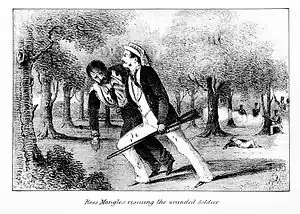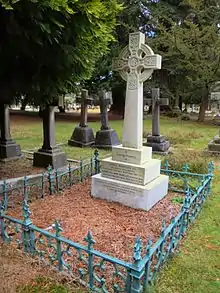Ross Mangles
Ross Lowis Mangles VC (14 April 1833 – 28 February 1905) was a British administrator in India and the recipient of the Victoria Cross, the highest and most prestigious award for gallantry in the face of the enemy that can be awarded to British and Commonwealth forces. Mangles is one of only five civilians to be awarded the Victoria Cross.
Ross Lowis Mangles | |
|---|---|
 | |
| Born | 14 April 1833 Calcutta, British India |
| Died | 28 February 1905 (aged 77) Pirbright, Surrey |
| Buried | 51.297390°N 0.625679°W |
| Allegiance | |
| Battles/wars | Indian Mutiny |
| Awards | Victoria Cross |
Biography
Early life
Mangles was the son of Ross Donnelly Mangles, sometime chairman of the East India Company.[1] He was educated at Windlesham House School, Brighton (1842–43),[2] Bath Grammar School and East India Company College (1851–52).[3] He took up a place in the Bengal Civil Service in 1853.[4]
Victoria Cross
He was 24 years old, and a civilian in the Bengal Civil Service during the Indian Mutiny when the following deed took place at Arrah for which he was awarded the VC:
Mr. Ross Lowis Mangles, of the Bengal Civil Service, Assistant Magistrate at Patna
Date of Act of Bravery, 30th July, 1857
Mr. Mangles volunteered and served with the Force, consisting of detachments of Her Majesty's 10th and 37th Regiments, and some Native Troops, despatched to the relief of Arrah, in July, 1857, under the Command of Captain Dunbar, of the 10th Regiment. The Force fell into an Ambuscade on the night of the 29th of July, 1857, and, during the retreat on the next morning, Mr. Mangles, with signal gallantry and generous self-devotion, and notwithstanding that he had himself been previously wounded, carried for several miles, out of action, a wounded soldier of Her Majesty's 37th Regiment, after binding up his wounds under a murderous fire, which killed or wounded almost the whole detachment and he bore him in safety to the boats.[5]
His Victoria Cross is displayed at the National Army Museum, Chelsea, England.
Subsequent life and career
Mangles held various positions in India, including those Judicial Commissioner of Mysore, Secretary to the Government of Bengal, and member of the Board of Revenue of the Lower Provinces.[6] He retired from Indian service in 1883, having completed thirty years' service, and returned to England, where he was a justice of the peace for Surrey. He died at his residence, The Lodge, Pirbright, Surrey, on 28 February 1905.[6]

He is buried in Brookwood Cemetery. On the north wall of St Michael and All Angels Church, Pirbright is a brass memorial to Mangles. The oaks on the plaque represent England, his native land; the palms are for India, scene of his life's work; his passion for growing roses after his retirement is also commemorated.[7]
Family
Mangles married in 1860 Henrietta Molyneux, youngest daughter of James More Molyneux, of Loseley Park, Surrey.[6]
References
- "Mangles collection, Surrey Archaeological Society". Retrieved 12 June 2016.
- Malden, Henry C. (1902). Muster Roll. Windlesham House, Brighton. A.D. 1837 to 1902 (2nd ed.). Brighton: H. & C. Treacher.
- Entry in the 'Writers' petitions' archival sub-series, British Library, Asia, Pacific & Africa Collections (ref. J/1/80/153-161).
- "East-India register and army list. 1857". HathiTrust. Retrieved 18 December 2018.
- "No. 22283". The London Gazette. 8 July 1859. p. 2629.
- "Obituary". The Times. 2 March 1905. p. 10.
- Julia Douëtil Welcome to St Michael and All Angels Church, Pirbright Archived 6 October 2011 at the Wayback Machine
External links
- Location of grave and VC medal (Brookwood Cemetery)
- The Brookwood Cemetery Society (Known holders of the Victoria Cross commemorated in Brookwood Cemetery)
- Ross L. Mangles VC
- Welcome to St Michael and All Angels Church, Pirbright